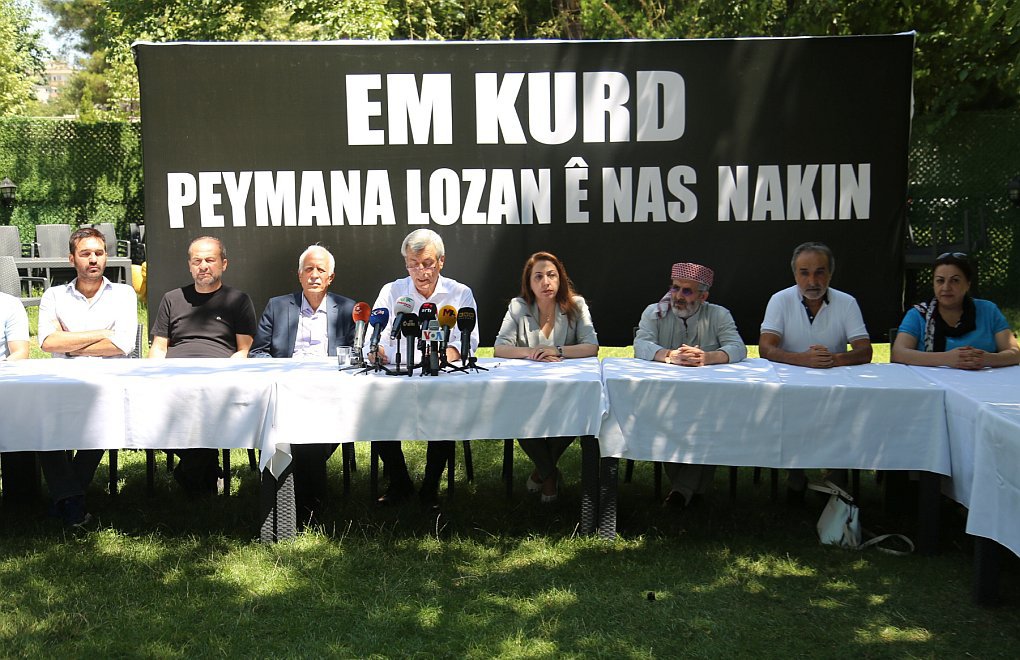Click to read the article in Turkish / Kurdish
Today marks the centenary of the Treaty of Lausanne, which largely defined the borders of modern Turkey following the conclusion of World War I. The treaty was signed on July 24, 1923, in the Swiss city of Lausanne and played a crucial role in shaping the geopolitical landscape of the region.
On this occasion, Kurdish civil society organizations and political parties gathered in Diyarbakır and issued a statement, demanding constitutional recognition for the Kurdish people. The treaty had significant implications for various ethnic and cultural groups within the newly formed Republic of Turkey. It only recognized Greeks (Rum), Armenians, and Jews as official minorities, leaving Kurds, which is the largest non-Turk ethnic group in Turkey, without constitutional recognition.
The event took place at the Diyarbakır Southeast Journalists Association (GGC), where a banner that read "Kurds do not recognize the Treaty of Lausanne" ("Em Kurd Peymana Lozan ê nas nakin") was hung.
"A century of denial"
Delievred both in Kurdish and Turkish, the statement said that the treaty has been synonymous with a "century of denial, negation, and atrocities against the Kurdish people."
Here is a summary of the statement:
"We firmly condemn the Treaty of Lausanne and its signatories, who disregarded our existence and suppressed our voice. We have never accepted this treaty, nor will we ever. Our struggle to overcome the barriers of the Treaty of Lausanne and achieve our Uational Right to Self-Determination will continue.
"The Kemalists, who sought support from the Kurdish people in the name of religious solidarity during the Ottoman Empire's dissolution, promising a state that would unite Turks and Kurds, conveniently forgot all their pledges after the signing of the Lausanne Treaty.
"On the 24th of July, 1923, the Ankara government secured official recognition under the Treaty of Lausanne, and, three months later, on the 29th of October, 1923, declared the Republic of Turkey, thereby institutionalizing denial and negation of the Kurdish people. The foundation of the Republic of Turkey was laid upon a single ethnic basis, disregarding the diverse and multicultural nature of the region it emerged from.
"The 1924 Constitution further alienated the Kurdish people, negating their language, culture, and existence, while adopting a citizenship concept that labeled everyone in Turkey as Turkish, regardless of their ethnicity."
Turkification and centralization
"The Kemalist regime, consisting of remnants from the Committee of Union and Progress (İttihat ve Terakki), continued the Turkification and Centralization policies that the Ottoman Empire initiated in the 1850s, marked by massacres, throughout the Republican era.
"Today, our gains in Kurdistan and Autonomous Rojava continue to face relentless attacks.
"Despite all these challenges and massacres, our people have persistently upheld the struggle for national freedom in all parts of Kurdistan. In Southern Kurdistan, our people have achieved a federal status since 2005.
"We view the formal establishment of the Kurdistan Regional Government and the de facto federal structure in Rojava as significant accomplishments.
"At this stage, the key to national freedom for the Kurdish people lies in comprehensive national unity, dialogue, and solidarity. Let us not forget that a century ago, our failure to forge a national alliance during the Lausanne process led to our losses.
"We call upon the signatory states of the Lausanne Treaty, particularly Britain and France, to apologize to our people and support the struggle to overcome its constraints. We urge the United Nations, the Council of Europe, the European Union, and other international organizations to back our struggle for the Right to Self-Determination."
Rights derived from being a nation
"We also address the Turkish state, urging them to abandon the repeated rhetoric of 'We founded the Republic together, Kurds and Turks are the two founding elements of the Republic, and we are brothers of a thousand years.' Instead, we demand that the law of brotherhood be upheld in accordance with justice. Let's move towards peaceful and democratic resolutions for the Kurdish issue, away from policies of war and denial.
"A new constitution should officially recognize the existence of the Kurdish people and their rights derived from being a nation. The Kurdish people have the right to live freely and honorably in their own country, Kurdistan, and this is also a precondition for the peace and stability of the region."
The statement was released by the following groups: Democratic Society Congress (DTK), Democratic Regions Party (DBP), Peoples' Democratic Party (HDP), Greens and Left Future Party (Green Left Party), Kurdistan Communist Party (KKP), Party of Human and Freedom (PIA), Kurdistan Socialist Party (PSK), Kurdistan Democratic Party-Turkey (PDK), Freedom Party, Freedom Movement, Revolutionary Democratic Kurdish Association (DDKD), Sheikh Said Association, and Kurdish Women's Union Platform.
(RT/VK)




